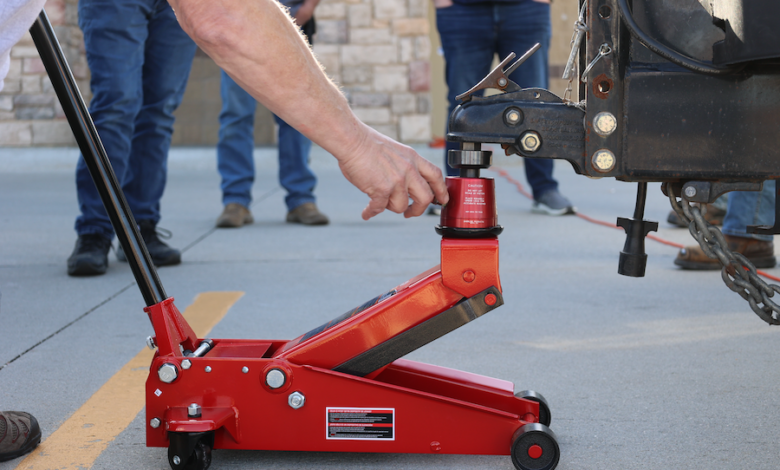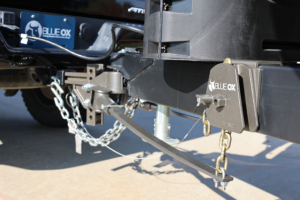Hitching a Ride: Expert Insight on Towing & Hitches
What dealers need to know about safe towing and hitches, and how to ensure customers leave with the correct hitch for their tow vehicle.

To get some insight on towing and hitches, RV PRO spoke with Alex Walker, director of sales at Blue Ox as well as Scott Stonehill, vice president of operations at PPL Motor Homes, and RV PRO Editorial Advisory Board member Randal Murray, who is director of orientation at Pete’s RV Dealer Group.
What are the main questions that dealers have about towing & hitches?
Walker: The biggest things are the gross vehicle weight rating (GVWR) for a trailer and what size of a hitch actually goes with that. So there’s two components really. You look at gross weight, which is the maximum amount that that trailer can hold in total weight, and then the second piece that’s really important with weight distribution specifically is tongue weight.
The tongue weight can vary based on a lot of different factors. Anything that you load … in front of the axles of the trailer can contribute to the tongue weight. That could be anything from loading clothes in a front bedroom, carrying water in a front water tank, adding LP tanks, batteries, any other accessories, bike racks on the front. And then anything that’s behind the rear axle of the tow vehicle also contributes to that tongue weight. So it’s about identifying what the actual tongue weight is of the vehicle and then picking the appropriate size hitch for that tongue weight.
The problem is when they weigh a vehicle, they weigh it as dry weight, [and] the vehicle itself [may not have] any fluids in it. It doesn’t have any full LP tanks; it doesn’t have any batteries on there. There’s nothing loaded inside. So it drastically changes from the time it’s dry to the time that it actually goes out on the road.
Are there questions dealers should ask customers to determine how they’re going to use their RV that would help them choose the correct tongue weight?

Walker: Absolutely. The No. 1 thing is to identify the [tow] vehicle they’re going to be using [and] know what the tow capacities are. Every vehicle’s going to have a maximum available weight of towing, and we want to make sure that they’re utilizing GVWR on the trailer, not dry weight, so that they know the maximum capacity. The other important thing is to double-check the capacity of the receiver hitch itself and the maximum tongue weight that it could have with weight distribution. There’s a tongue weight that can be used just going right onto a ball in that receiver hitch, and then there’s a tongue weight that can be used with weight distribution. Confirm essentially what the capacity is of the vehicle that they’re going to tow with in order to select an appropriate trailer that can fit within those guidelines.
We have an actual training team that goes around, and we specifically focus on those items — identifying GVWR, identifying the proper tongue weight, using a tongue scale and then knowing the capacities of the tow vehicle itself.
What Dealers Have To Say:
What are the main questions customers bring to you & how do you address them?
Murray: This truly depends on the customer. Customers are sometimes taken aback with the cost. A good weight distributing hitch with built-in sway control can be up toward a thousand dollars. Add a brake controller, and [customers] are spending $1,500 that [they] were not planning on to tow [their] new travel trailer.
We educate and should be letting the customers know early in the process what they will potentially need. We do not like surprises. I train our people to talk about the safety aspect of our hitch gear. I also train on how and where sway happens, so we can educate the customer on the dangers that can come from towing if not properly equipped.
Stonehill: The main questions customers bring to PPL are as follows: What is the safest hitch I can buy? Which hitch offers the most benefits? What is the safest hitch with the most benefits at the lowest price? PPL’s process, outlined in the answer below, provides insights on how we address these questions.
Do you have any guidance on what dealers most need to know about these products?
Walker: I think understanding the capacities is the biggest thing, and making sure that they appropriately weigh the trailer tongue. There are tongue scales available that can weigh the actual tongue weight. When they come from the manufacturer, like I said, they don’t have full LP tanks, they don’t have batteries in the front, so that tongue weight is going to change. [Make] sure they scale the tongue of the trailer to identify the appropriate hitch that’s needed. Sometimes you try to make a hitch work, but as that load changes, if it’s not the appropriate hitch for that specific weight rating, you might not have the best towing experience possible.
What Dealers Have To Say:
What do you think dealers need to know most about these products?
Murray: People selling hitches should know what it feels like to have a trailer sway behind them, so they can relay their experience during the sales process. People selling hitches should know how they work as well — that way they can overcome objections during the selling process. Personally, I will address the moms when I am selling weight distribution, as they are much more in tune with safety than most of the guys out there when it comes to towing. Dealers should also know the tow vehicles on the market, know what works and what doesn’t. I also train on “P” or passenger vehicle tires, which 95% of half-ton trucks come with. These tires give a great ride when not towing, so they make sense. When towing with no anti-sway properties, these tires are very susceptible to sway because of the lighter duty sidewall, [and] we talk about that with customers. The Ford F-150 is the most popular selling truck on the market.

Stonehill: First, dealers need to know the towing capability of the customers tow vehicle and the weight ratings of their RV. The year, make, model, engine, transmission and optional equipment on the customer’s tow vehicle will impact their towing capability. The hitch must be rated for the weight of the RV, and customers must understand the differences between the RV’s unloaded weight and gross vehicle weight. Once the weight rating of the hitch is determined, the customer will typically have three hitch options to choose from: good, better and best. The good hitch will mainly be the lowest price and be the most difficult to assemble and hitch correctly. Dealers should always offer all options to the customer and explain the reasons that hitches have different price tiers. Typically, it is ease of use and safety that causes the price to be higher as you move up in quality.
What are some of the most misunderstood things that customers face & dealers are having to explain?
Walker: The maximum towing capacity of the tow vehicle — I think that’s the biggest misconception. And it’s something that’s not always readily available. You’re going to have to go and look for it. I always encourage dealers and customers alike [to never] push your maximum capacity.
I think the important thing for dealers is making sure that [customers] purchase a unit that can be towed by the vehicle they want to tow it with. And if they have a unit that’s larger, they’re going to need to go look for a different vehicle that can hold that capacity. Because, just like a lot of things, trucks have changed a lot over the years. They went from being tow-made vehicles to more grocery-getters. There’s talk of some manufacturers going to carbon fiber, so they’re using lighter materials, which gets better gas mileage. They’re putting features on like ride leveling. The faster you drive, the more your vehicle sinks to the ground to make it more aerodynamic. So [you need to understand] the maximum capacities that tow vehicle can have and then any features that are related to it — some of them have factory sway control built in, which activates the rear brakes in individual moments to help try to center a trailer. That stuff is more intended for use of small trailers and boats, for example. Not so much with weight distribution. It’s just really understanding what the limitations are of the tow vehicle itself and what its capacities are, and trying to stay within that range to make sure that that vehicle can handle whatever that trailer is.
What Dealers Have To Say:
What are some of the most misunderstood things that customers face & dealers are having to explain?

Murray: Tow vehicle payloads is often a discussion that is not represented properly in the RV world, especially when talking about pulling a fifth wheel. I also think that today’s half-ton trucks are overstated when it comes to towing. Just because your truck’s drivetrain can tow a crazy amount of weight doesn’t mean you should. Some of today’s half-ton trucks are stating that they will tow 12,000 and 13,000 pounds. I do not recommend this with a half-ton truck, even if it says it can. Again, people selling hitches and talking about towability should have practical experience in these matters in my opinion.
Stonehill: The most misunderstood perception many customers have is that they can just hook their RV to a ball, with safety chains, and that is all they need. Dealers must explain the function of the weight distribution hitch and how it works. It’s crucial for the customer to purchase the correct hitch and have it professionally installed to keep all occupants of the tow vehicle safe.
What can happen if the right hitch isn’t used?
Walker: Essentially, you’re sacrificing ride quality overall. So if you don’t have the appropriate hitch, you’re not going to get the right amount of either sway prevention or sway control. And then you’re probably not going to get … the maximum amount of weight distribution. So that weight distribution might not work to its maximum effect or distribute the weight properly without the properly sized hitch. So it’s going to reduce the purpose of the weight distribution factor. It’s also going to reduce your sway control or sway prevention. It’s going to affect the ride quality. So you’re going to feel more effects in the actual tow vehicle of what the trailer’s doing. The ride’s not going to be to its maximum comfort for the driver and their family.
Educating [customers] on different products that are available to help with that [is important]. There’s suspension products, there’s airbags, there’s rubber springs, there’s different products that can help boost the experience. There’s really nothing that you can add to make [a tow vehicle] a higher capacity, but there are products available to help with those types of things. I’ll [use a Dodge Ram] as an example. It’s got a coil spring suspension instead of a leaf spring suspension, so the back end can bounce and it has a little more give to it. So you might have to adjust the weight distributing hitch a little bit higher on the ball than you normally would to compensate for that. But there’s also different products available to help augment suspension on these types of vehicles. [Dealers need to know] what kind of add-on products are available to make that vehicle more tow ready.
They [also] need to know what the capacities are because there are some vehicles that have what’s called a unibody chassis that you’re not supposed to use weight distribution with. So it’s just doing the research on the vehicle itself and the towing capacities and components to make sure that [customers] have everything that they would need in order to tow [their RV].
What Dealers Have To Say:
What can happen if a travel trailer isn’t hitched properly?
Murray: When trailers are not set up or “hitched” properly, they can be dangerous, especially at highway speeds as that is when sway typically happens. Speed, wind, inertia, other vehicles, flat plane, compounded can lead to sway conditions when highway traveling. With all the new people towing on the roads today, it’s imperative we do the best job we can when it comes to educating about safe towing.
Stonehill: If your hitch and trailer are not hitched properly, it could create an unsafe towing situation and cause [customers] to lose control while towing the RV. It is very important that [customers] have the hitch height correct and weight distribution connected properly.
Is there anything else you come across that’s challenging for dealers when you do training with them on your products?

Walker: I think the biggest thing is keeping people educated as they get new employees — new technicians, new parts and sales service people — and making sure that everybody’s trained on the products, so not just the technician knows how to install it, but the salespeople understand the features and benefits for the customer. The parts people understand the SKU list that they need, also the features and benefits, and service understands how to check those products and confirm that they’ve got the right unit.
So I wouldn’t say it’s necessarily a challenge, but I think it’s important that everybody at the dealership is educated on what they need to know on the product so that everybody’s speaking the same language and on the same page to give that full-circle customer experience. So that [the customer knows] what the features and benefits are of what they’re buying. [And so that] it gets installed correctly and used properly on the road.
What Dealers Have To Say:
Do you have any advice for other dealers regarding towing & hitches?
Murray: My advice: Know your product, and know what safe and unsafe towing feels like. This way you can represent it properly when you are talking about it.
Stonehill: We recommend that all dealers conduct training on a regular basis to ensure they provide the best options possible to the customer. We have annual training conducted by our hitch manufacturers as well as in-house training quarterly to ensure our parts and service personnel are up to date on all the latest innovations in hitches.



